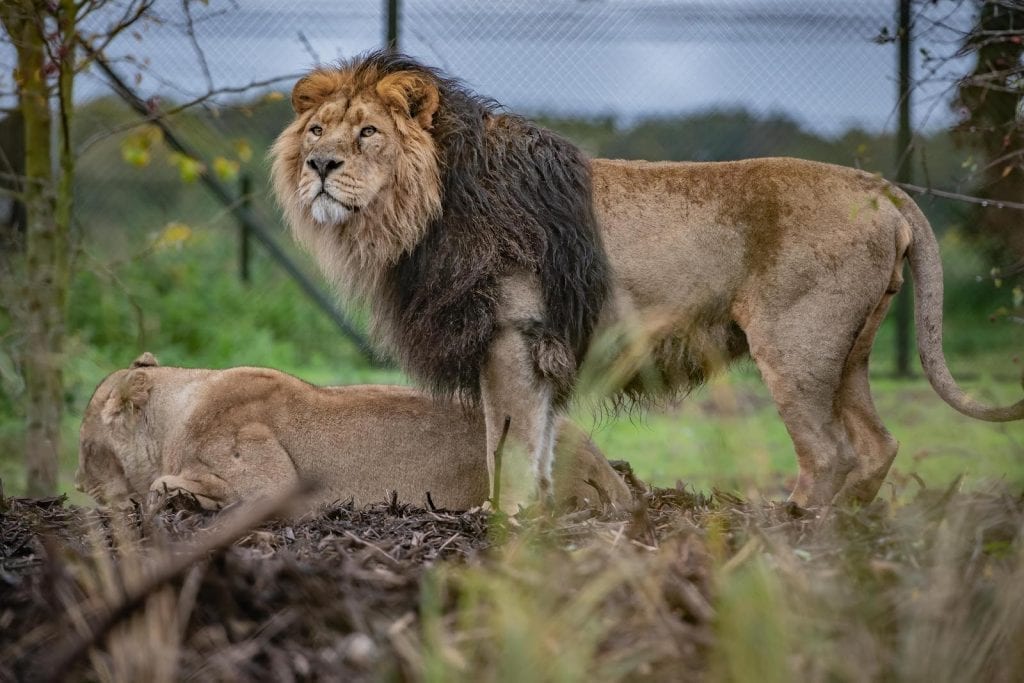A pride of Asiatic lions – the world’s rarest lion species – have taken their first steps into a specially-created new home at Chester Zoo.
The zoo’s new conservation area is the UK’s largest habitat for Asiatic lions.
The habitat is designed to recreate the environment of the Gir Forest region of India, where the last few hundred Asiatic lions live in the wild.
The zoo hopes a new visitor zone will raise awareness of the threats faced by Asiatic lions in the wild, including human-wildlife conflict, and the conservation action needed to protect the species.
Lionesses Kumari and Kiburi – along with adult male Iblis – have been exploring their sprawling new home, before the space opens to visitors for the first time on Friday (18 October).

Dave Hall, Team Manager of Carnivores at Chester Zoo, said:
“Asiatic lions are impressively built animals, with compact bodies, powerful legs and strong jaws and teeth, making them superb hunters.
“Their retractable claws, which they use for gripping tightly on to prey, can be up to 38mm long and they have rough tongues, like sandpaper, for scraping meat from bones.
“They are truly majestic animals. This brand new habitat at the zoo – the largest in the UK – really is a fitting new home for them.”
The area – which has been specially created by the zoo’s carnivore experts – spans 4,780 square metres in total.
Recreating the scrubland savannahs of India’s Gir Forest region, the dry forest habitat contains raised hilltop viewing points for the pride, as well as heated rocks and a water hole.
The habitat is also complete with heated indoor dens, which zoo experts hope will one day be the perfect environment for cubs. The state-of-the-art facility could be a major boost to the European breeding programme for the species, which is teetering on the brink of extinction in the wild.
As few as 650 lions are thought to remain in the wild. Poaching, human-wildlife conflict, habitat loss and disease have caused a catastrophic decline in Asiatic lion populations in their natural range.
The last Asiatic lions’ populations survive in Gujarat, India, in the Gir Forest region, but this is just 0.1% of their former territories. The species once roamed across Northern Africa, Greece, Turkey and Asia but are now confined to one small region of India, where natural disaster or an outbreak of disease could wipe out the entire species.
Local community action, supported by international conservationists, has helped to slowly increase numbers in recent years, but the species remains ‘endangered’ on the International Union for the Conservation of Nature’s (IUCN) ‘Red List’ of threatened species – meaning it is still faced with a high chance of extinction.
Dr Mark Pilgrim, Chester Zoo’s Chief Executive Officer, said:
“This remarkable species is facing a very uncertain future. The European endangered species breeding programme is critically important. If the worst was to happen in the wild, good zoos would be the only thing standing between Asiatic lions and extinction.
“We’re very proud to be able to give the Asiatic lion pride the world’s best conservation breeding facilities. We also hope the new area will help us raise much-needed awareness about the plight of Asiatic lions.
“Lions were among the first carnivores cared for here by Chester Zoo’s founder George Mottershead. He was a pioneering animal welfare advocate, who realised his vision for the first ‘zoo without bars’. Our ongoing habitat creation programme continues to deliver George’s ‘always building’ philosophy, which has pushed the boundaries of world-class animal welfare and conservation in zoos.”
The new habitat – which has been created using environmentally considerate construction techniques – has been created using the latest sustainable construction standards. Climate controlled dens, heated by sustainable “green” energy and supported by fully insulated walls and roof, will minimise power consumption in order to create year-round optimum conditions for the big cats.
The Asiatic lion habitat will open to visitors from Friday 18 October. Entry is free, with normal zoo admission. Zoo tickets can be booked via www.chesterzoo.org

